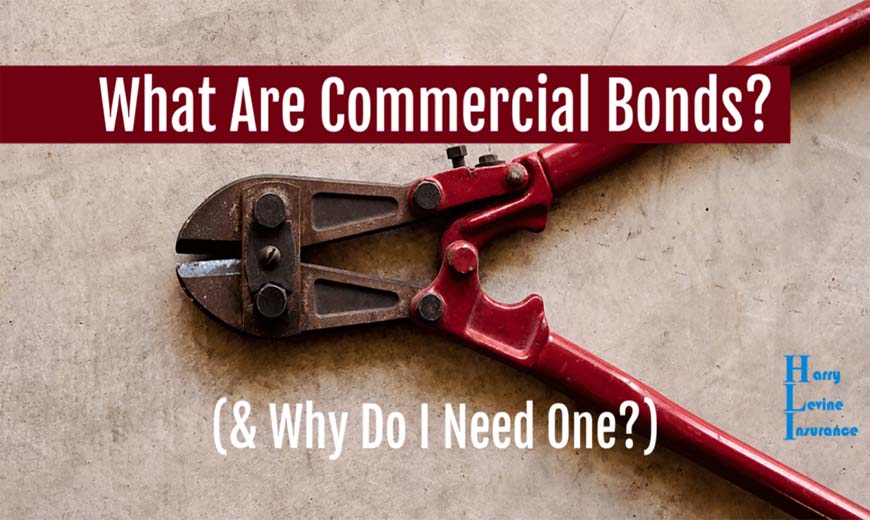“I was just hired to re-pave the parking lot at my local library, but they’re requiring me to have a commercial bond…what is that and why do I need one?”
At Harry Levine Insurance, we get questions like this all the time.
Although commercial bonds aren’t an insurance policy in the traditional sense, they do provide a financial guarantee of your work and protect your customers against risk.
In this article, we’ll discuss the different types of commercial bonds, why you need them, how much they cost, and how to get one.
What Are Commercial Bonds?
In a way, commercial bonds are a lot like insurance.
Insurance and bonds both compensate you for a loss; the difference is in what types of loss they cover and who is reimbursed for the loss.
Rather than insuring your own property against damage, you’re insuring someone else’s property against your own (potential) misdeeds. Insurance is protection for yourself, commercial bonds are protection for your clients.
When you purchase an insurance policy, there are two parties: the person buying the policy (the insured) and the company issuing the policy (the insurance company). When a commercial bond is issued, there are generally three parties: the company performing the work (the bond holder or principal), the party for whom the work is being done (obligee), and the company providing the bond (surety company).
This is just an overview of what commercial bonds are. To understand them better, we need to take a closer look at the different types of commercial bonds available.
Types of Commercial Bonds
The two most common types of commercial bonds are surety bonds and fidelity bonds.
While they both fall under the umbrella of “commercial bond,” the two are very different. Depending on what type of business you own, you might need one over the other or even both.
Surety Bonds
Surety bonds are the most common type of commercial bond and are typically requested by the party for whom the work is being done.
Whether you’re a roofer working on a residential home or a landscaper with a city government contract, a surety bond is a way to guarantee that the person, business, or agency that hired you will get what they paid for.
Contractors are often asked to provide a surety bond by savvy homeowners and government agencies before they start work. If you fail to do the job you were hired for, the bond will hire another contractor to finish the job.
Without a bond, that homeowner or city office not only loses all the money they paid you, they now have to pay someone else.
Now, if you’re thinking, “That sounds great! I’ll just purchase a surety bond for every project and stay at home to watch The Price is Right! It’s totally worth the cost!” stop right there. If you do play hooky and the surety company has to step in for you, they have the right to come back to the principal (that’s you) to reimburse them for the cost of the entire job.
Fidelity Bonds
Fidelity bonds, on the other hand, protect certain acts—such as theft, embezzlement, or employee misconduct—that a typical insurance policy won’t cover. If you have seen companies advertising that they are “licensed and bonded,” they are likely referring to a fidelity bond.
This type of bond is designed for service-based businesses, especially those with employees working on a customer’s premises. A good way to distinguish fidelity bonds from your average general liability policy is that liability insurance covers accidents, while fidelity bonds cover intentional acts.
For example, if you own a cleaning company and one of your employees is convicted of stealing jewelry from a client, the surety company would reimburse the customer for the jewelry, while a homeowner’s insurance policy would not.
Other Types of Commercial Bonds
While some commercial bonds are optional, others are required by the State of Florida for certain businesses and industries.
- Florida Alcoholic Beverages and Tobacco Bond
- Lottery Bond
- Sales Tax Bond
- Taxable Fuel Bond
- Utility Bond
- Wage and Welfare Bond
These bonds guarantee that the business will pay all appropriate taxes and follow State regulations.
Why Do I Need Commercial Bond Insurance?
The primary reason you might be required to purchase a commercial bond is that your customer requires you to.
Surety bonds are often required by cities, counties, or other local government entities in order for a contractor to pull a permit to conduct work within the jurisdiction.
Government entities not only want to ensure that the contractor with the lowest bid is going to complete the job (and do it well), they also want to ensure that the contractor will comply with the applicable laws and regulations and guarantee indemnity to third parties. For example, a sign business hired to hang signs over public sidewalks may be required to provide a bond to guarantee compensation for injuries to pedestrians.
Another good reason is that fidelity bonds cover things that standard general liability insurance doesn’t. If the above-mentioned cleaning company is sued for the replacement cost of the stolen necklace, the average insurance company will wash their hands of it and tell you, “Good luck in court!”
The last reason—though certainly not the least—is that commercial bonds are an act of good faith. They give your customers the assurance that they will get what they paid for, even if you don’t end up doing the work.
With service-based businesses, a stellar reputation is key.
How Much Do Commercial Bonds Cost?
There are no set rates for commercial bonds as there are many factors that can impact the cost, such as the type of bond, the amount of coverage, and the surety company that issues the bond. As with all insurance, bonds are written and reviewed on a case-by-case basis.
Fidelity bonds are anywhere from $200-1,000 a year, depending on your coverage limit. Surety bonds are usually a one-time payment equal to 2-5% of the project cost. So if your contract for a bathroom renovation is $20,000, your bond will cost $400 (at a 2% rate).
How Do I Get One?
You can purchase a commercial bond from a surety company or insurance agent who carries them.
In most cases, they will need to know:
- Who is requesting the bond from you;
- What type of work you’re performing; and
- What type of coverage the bond has.
For some types of bonds, you may be asked to provide financial and tax statements for both the LLC and corporation, in addition to the personal financial information for all owners and officers of the organization.
Conclusion
For many types of business, there is a huge “trust gap” between you and the public. How can they be sure that you will do the work you’re being paid to do (and do it correctly)?
Commercial bonds are the solution to this problem.
With fidelity and surety bonds, you can provide your customers the satisfaction of knowing that you stand behind your work, your employees, and your reputation. General liability and other types of commercial insurance are great (and necessary), but they don’t provide across-the-board coverage.
Whether you need a commercial surety bond to guarantee a particular project or a fidelity bond to vouch for your employees, Harry Levine Insurance can help. As one of Orlando’s premier insurance agencies for more than 30 years, our focus is on building a customized network of policies that fit your budget and your needs. Call now or request a free quote so that we can help you build that trust and reputation. Save










Comment (1)
Lily Bridgers
September 30, 2023Thanks for helping me understand how bonds and insurance both reward you for losses; the distinction is in the sorts of losses they cover and who is compensated. You also explained that you are protecting someone else’s property against your own (possible) wrongdoings rather than insuring your own property against loss. I will be relaying this information to my dad who opened his real estate company last year. I’m sure he’d wanna look into getting a business service bond after he reads this.